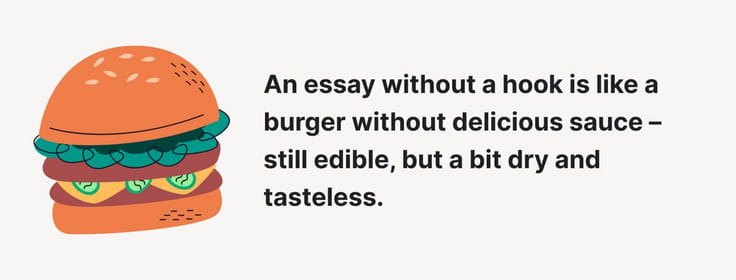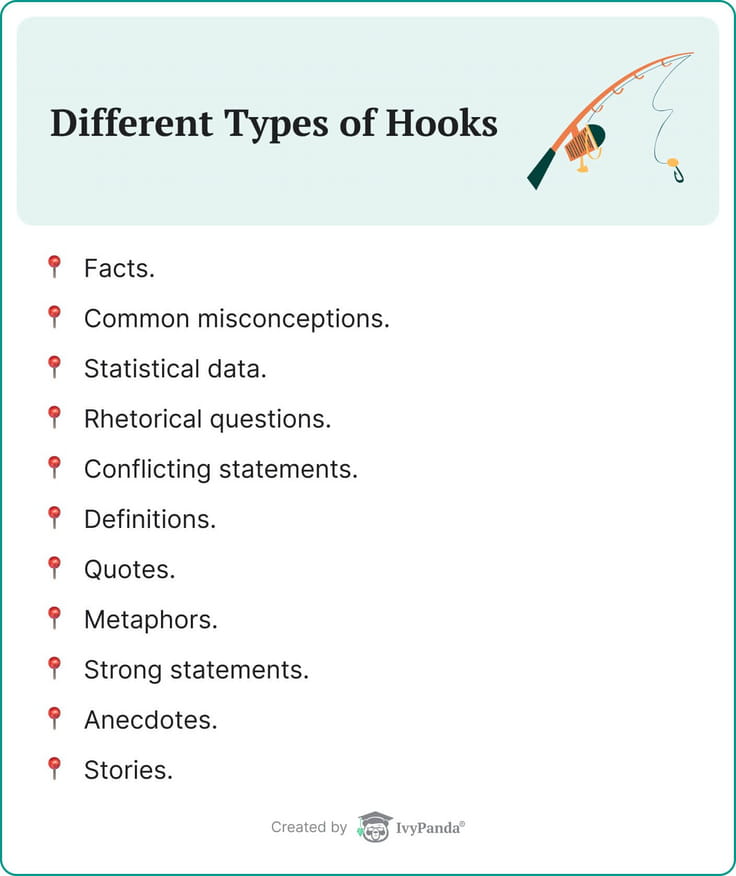Hook Generator for Engaging Openings
🎣 Do I Need a Hook for Essays?
Students often spend a lot of time procrastinating on their work because they need help figuring out where to start. Writing an introduction to any paper is a challenge. That's why here, we bring to your attention our hook examples generator. This straightforward and easy-to-use tool not only will not only support you in getting started on your project, but will also make it even more engaging for your audience.
So, what is a hook? And what is it for? Let's find out together!
What Is a Hook?
A hook appears in the text as an opening sentence or paragraph that forms first impression and encourages readers to continue reading.
The hook aims to set the essay's tone and style, allowing you to stand out, but this part differs from the introduction.
So, after you have intrigued the reader, you can introduce the topic by giving background information and a thesis statement.

As for the size, the hook can range from 1 sentence to an entire 6-sentence paragraph. It all depends on the expected length of your paper, the hook type, and your preferences. When you choose the hook type, consider the audience and the purpose. However, you shouldn’t overload it with unnecessary details. It may have good content and lots of information, but it won't be as appealing and memorable as you could imagine.
How to Write a Good Hook
Whether you're writing a philosophy essay, a descriptive essay, or an essay about your personal story, you will find help in our advice. In the following section, we'll tell you what to pay attention to. We'll also give you some tips to make your hook writing process easier and point you in the right direction.
💡 Examples of Hooks in Writing
The truth is, almost anything can be a hook. A well-constructed statement, an interesting fact, or an appropriate quote can make excellent openings for your introduction. Nevertheless, some of them will be more effective than others, depending on the kind of work you do. Here, we'll tell you about different examples of hooks in writing.

Argumentative Essay Hooks
As this essay type aims to research, present, and explain evidence, two hooks will work for you — fact and common misconception. If you choose to go with the factual approach, you should find something captivating. We can't use a fact that we've heard many times before. If you can’t find a piece of impressive information, then use a common misconception. This will intrigue your audience and motivate them to read on to find the truth.
Bacteria are tiny but scary-looking organisms that can make one frightened even on a photograph. However, not all of them are harmful. While some bacteria spread disease, others help our bodies absorb nutrients and digest food.
Informative Essay Hooks
As a rule, an informative essay aims to educate your readers or advance in-depth on a topic. A hook with statistical data will work fine in this case. The main thing is to cite the source to avoid sounding baseless. It’d also be interesting to start with a question to stimulate reasoning from the audience. There is a good chance that a provocative question will motivate reading.
What would you do if a tarantula bit your friend?
Expository Essay Hooks
An expository essay is a revealing text with factual information for comparisons and contrasts. Consequently, it'd be ideal to use conflict as a hook. For example, you could give several opinions on the topic.
On the one hand, genetic engineering helps us to fight diseases and gene defects, but on the other hand, people find it unethical and unnatural.
Another option is to use a definition as a hook, which can be straightforward yet effective.
Success is often used to describe achieving a desired outcome. However, success means different things to different people.
Literary Analysis Hooks
A literary analysis aims to examine or evaluate a work of literature carefully. Therefore, a quotation hook is excellent because you can take a famous or relevant quote to make an essay memorable and thought-provoking.
“So we beat on, boats against the current, borne back ceaselessly into the past” - this is how Fitzgerald’s The Great Gatsby ends.
The same powerful impact on reflection has a hook phrased as a metaphor. The reader may need time to understand what the paper is about or interpret it differently.
Presentation Hooks
You can present your material in many ways, depending on the topic and the tone you want to set. You can start with an exciting question for intrigue or use a striking fact. It's equally effective to give statistics, if those are relevant to your presentation. But one unusual choice would be a strong statement hook. We use it to provide an affirmative stance about a certain topic that leaves no room for discussion. In turn, your audience will definitely be intrigued to see how you can back up your position.
Vegetarianism is an example of a healthy and balanced nutrition.
Personal Statement Hooks
A personal statement is used by university applicants or job candidates. Therefore, the primary purpose of such an essay is to stand out among competitors. So, a great option is to start with an anecdote, immediately setting the readers into a positive mindset. Then, you increase your chances of being remembered with good associations. Alternatively, you can start with a story or a relevant. But remember that this is an academic type of writing, and you need to know the measure and stay formal.
The most memorable experience during my undergraduate studies was...
Also, we recommend the descriptive hook, which is brilliant for a personal narrative. You can write about a successful project you’re planning or have done.
Did our hook examples generator help you in your work? If you want to know more about it, read our FAQ section below!
❓ Hook Examples Generator – FAQ
Updated:
🔗 References
- How to Write a Hook – East Stroudsburg University
- Hooks and Grabbers – Las Positas College
- How to Write a Hook: Essay Writing~Introduction – The Learning Depot
- Hooks and Attention Grabbers - Tutoring and Learning Centre, George Brown College
- Different Types of Hooks for Essays with Examples – HighArts.org